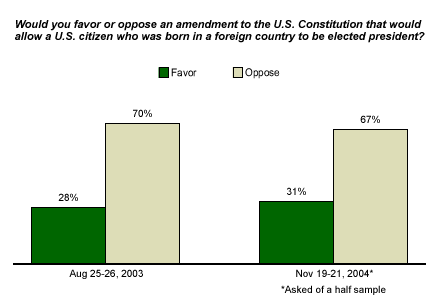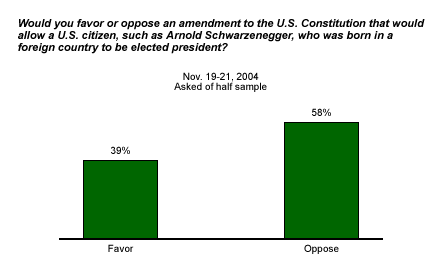In the January issue of Vanity Fair, California Gov. Arnold Schwarzenegger and his wife, Maria Shriver, talk frankly about their marriage and the adversities they faced during his gubernatorial campaign. But it may be Shriver's predictions for Schwarzenegger's political future -- including talk about a presidential bid -- that are generating the most buzz.
Because Schwarzenegger was born in Austria and became a U.S. citizen in 1983, his presidential eligibility would hinge on the passage of a constitutional amendment allowing foreign-born citizens to run for president. In the Vanity Fair interview, Shriver says she supports such an amendment, but doesn't think it will happen. "The process takes years, and this is as far as it goes," she says. Maybe or maybe not, but the American public appears lukewarm on the idea.
A recent Gallup Poll* tested the public's support for such an amendment with two questions. The first question asked respondents generally if they favor an amendment allowing foreign-born U.S. citizens to run for president. A separate sample of respondents was asked virtually the same question, but with Schwarzenegger's name mentioned. In both cases, a majority of Americans oppose the idea, but people are more favorable to the idea when Schwarzenegger's name is mentioned.
According to the more general question, less than a third (31%) of Americans would favor an amendment to the U.S. Constitution that would "allow a U.S. citizen who was born in a foreign country to be elected president." Two-thirds (67%) would oppose such an amendment. These results are roughly in line with results from a survey conducted in August 2003, while Schwarzenegger was campaigning for governor.

When Schwarzenegger's name is mentioned ("Would you favor or oppose an amendment to the U.S. Constitution that would allow a U.S. citizen, such as Arnold Schwarzenegger, who was born in a foreign country to be elected president?"), the public warms to the idea a little. Specifically, 39% of respondents to this question say they would favor an amendment, while 58% say they would oppose it.

A Non-Partisan Topic?
The buzz about this amendment, which would require ratification by two-thirds of both houses of Congress and three-fourths of the state legislatures, has caused considerable political hand wringing inside the Beltway. Some Democrats fear that the amendment is nothing more than an effort to further Schwarzenegger's political ambitions. At an Oct. 5 hearing on the proposed Equal Right to Govern Amendment, Republican Sen. Orrin Hatch, who had introduced the amendment in July, said the restriction on naturalized U.S. citizens "has become an anachronism that is decidedly un-American." Democratic Sen. Diane Feinstein disagreed, saying, "I don't think it is unfair to say the president of the United States should be a native-born citizen. Your allegiance is driven by your birth."
But somewhat surprisingly, public opinion on the topic does not vary dramatically by political party affiliation. Similar percentages of Democrats and Republicans favor and oppose the idea, no matter how the question is posed.
When Schwarzenegger's name isn't used, 34% of Democrats and 30% of Republicans favor an amendment, while more than 60% of those identifying with either party oppose it. The proportions are about the same in the question that mentions Schwarzenegger by name. Roughly 4 in 10 Republicans and Democrats favor the amendment in that case, while more than half oppose it.
*These results are based on telephone interviews with randomly selected national samples of 500 and 515 adults, aged 18 and older, conducted Nov. 19-21, 2004. For results based on these samples, one can say with 95% confidence that the maximum error attributable to sampling and other random effects is ±5 percentage points. In addition to sampling error, question wording and practical difficulties in conducting surveys can introduce error or bias into the findings of public opinion polls.
